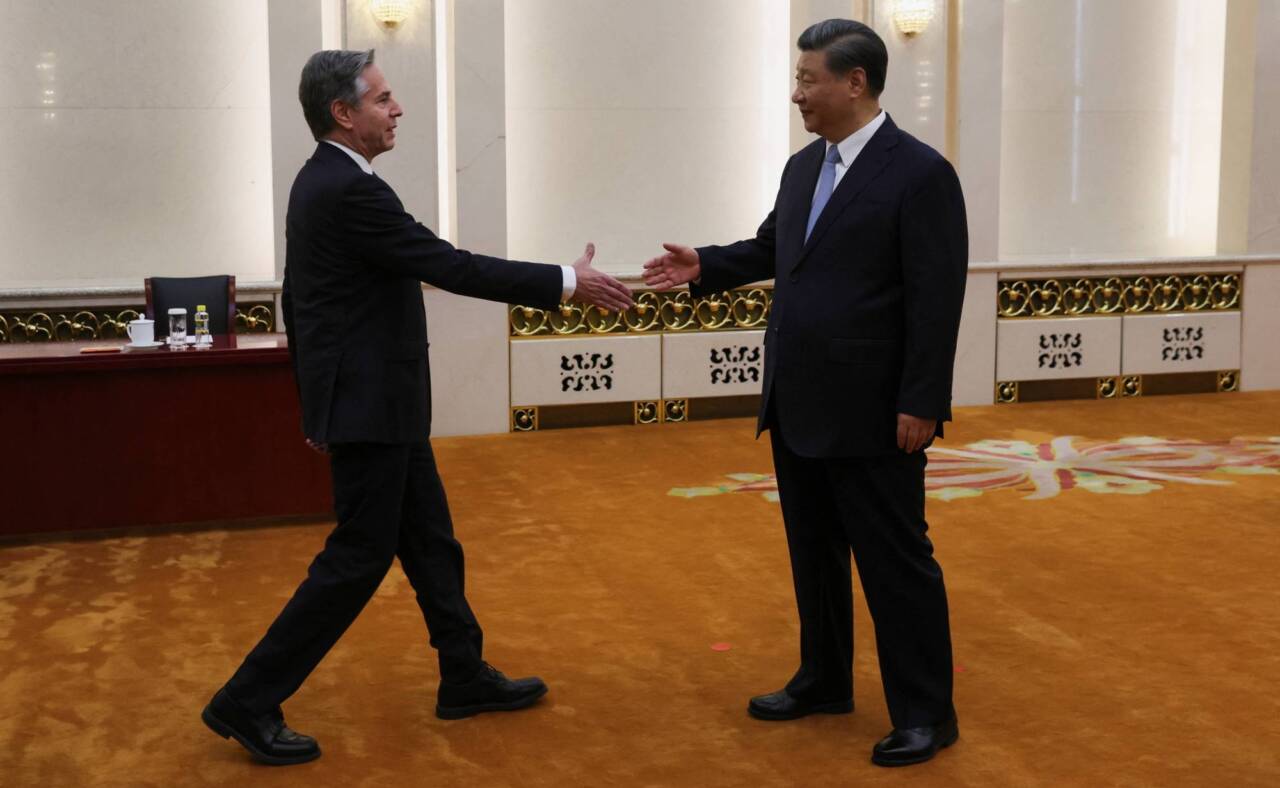
Beijing: US Secretary of State, Antony Blinken, at the end of his trip to Beijing, said that the two powers made ‘progress’ on some of the key issues and also agreed on the need to ‘stabilize’ the relationship. In response, Chinese President Xi Jinping also stressed an ‘overall stable Sino-US relationship’, but at the same time, stressed that China ‘respects’ the US’s interests and it should also not harm ‘China’s legitimate rights and interests’.
Antony Blinken met Chinese President Xi Jinping, Director of the CCP Central Foreign Affairs Office Wang Yi, and State Councilor and Foreign Minister Qin Gang during his Beijing visit. ‘We’re not going to have success on every issue between us on any given day, but in a whole variety of areas, on the terms that we set for this trip, we have made progress and we are moving forward. But again, I want to emphasize none of this gets resolved with one visit, one trip, one conversation. It’s a process’, Blinken said at a news conference at the end of his trip to the Chinese capital Monday.
‘I came to Beijing to strengthen high-level channels of communication, to make clear our positions and intentions in areas of disagreement, and to explore areas where we might work together on our interests, align on shared transnational challenges, and we did all of that’, Blinken added. Blinken further noted that he had ‘an important conversation with President Xi Jinping’, and described his conversations with China’s top foreign affairs adviser Wang Yi and Foreign Minister Qin Gang as ‘candid, substantive and constructive’, adding that, ‘We both agree on the need to stabilize our relationship’. He further added that his conversations touched on the Ukraine war and North Korea.
Blinken also raised US concerns ‘shared by a growing number of countries about Beijing’s provocative actions to the Taiwan Strait, as well as in the South and East China Seas’. He said the US position on Taiwan has not changed and also pressed China over ‘human rights’. Blinken said China assured the US and other countries that it will not provide lethal aid to Russia and ‘we have not seen any evidence that contradicts that’, though he noted that China’s assurance was in keeping with repeated statements made in recent weeks.
‘The world needs an overall stable Sino-US relationship, and whether China and the United States can get along has a bearing on the future and destiny of mankind’, Xi told Blinken, CNN cited a Chinese readout of the meeting. Xi added, ‘China respects the interests of the United States and will not challenge or replace the United States. Similarly, the United States must also respect China and not harm China’s legitimate rights and interests’. The readout said that Xi told Blinken that the world needs stable China-US relations and that the future of humanity hinges on both getting along.
Matthew Miller, the spokesperson of, the US State Department said in a statement that the two sides had candid, substantive, and constructive discussions on key priorities in the bilateral relationship and on a range of global and regional issues. ‘The Secretary emphasized the importance of maintaining open channels of communication across the full range of issues to reduce the risk of miscalculation. He made clear that while we will compete vigorously, the United States will responsibly manage that competition so that the relationship does not veer into conflict. The Secretary stressed that the United States would continue to use diplomacy to raise areas of concern as well as areas of potential cooperation where our interests align’, he said.
Miller further added that Blinken emphasized that it remains a priority for the United States to resolve the cases of American citizens who are wrongfully detained or subject to exit bans in China. ‘The Secretary addressed the PRC’s unfair and nonmarket economic practices and recent actions against U.S. firms. The Secretary raised concerns about PRC human rights violations in Xinjiang, Tibet, and Hong Kong, as well as individual cases of concern. The Secretary underscored the importance of maintaining peace and stability across the Taiwan Strait and reiterated there has been no change to the U.S. one-China policy, based on the Taiwan Relations Act, the three Joint Communiques, and the Six Assurances. The two sides discussed a range of global and regional security issues, including Russia’s war of aggression against Ukraine, the DPRK’s provocative actions, and U.S. concerns with PRC intelligence activities in Cuba’, he added.
Earlier on Sunday, Antony Blinken met Chinese Foreign Minister Qin Gang in Beijing, in the highest-level trip by a US official to China in nearly five years, which aims to stabilise the relations between the two powers. A roughly three-hour meeting between Blinken and Wang earlier Monday underscored the deep challenges in overcoming the mistrust and friction that has come to characterize the relationship, CNN reported. Wang blamed Washington’s ‘wrong perception’ of China as the ‘root cause’ of the decline in the two sides’ relations and demanded the US stop ‘suppressing’ China’s technological development and hyping the ‘China threat’, CNN cited a readout from Chinese state broadcaster CCTV.
‘We must reverse the downward spiral of China-US relations, promote a return to a healthy and stable track, and jointly find the right way for China and the United States to co-exist in the new era’, Wang said, adding that, ‘Blinken’s visit came at a critical juncture in US-China relations, where a choice needs to be made between dialogue or confrontation, cooperation or conflict’. Wang also reiterated that Taiwan is one of one of China’s ‘core interests’, over which it ‘has no room for compromise or back down’. Blinken’s two-day trip to Beijing comes during the frosty bilateral ties and follows the discovery of a suspected spy balloon above the US in February that caused him to delay the trip which was planned for the same month.

Post Your Comments